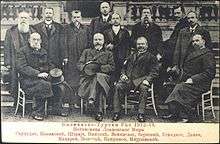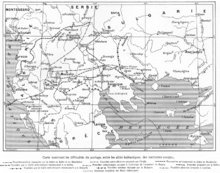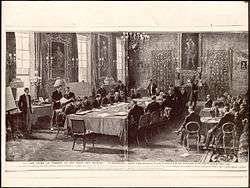London Conference of 1912–1913
The London Conference of 1912–1913, also known as the London Peace Conference or the Conference of the Ambassadors, was an international summit of the six Great Powers of that time (Great Britain, France, Germany, Austria-Hungary, Russia and Italy) convened in December 1912 due to the successes of the Balkan League armies against the Ottoman Empire in the First Balkan War. In particular, the conference intended to arbitrate between the warring powers as to territorial acquisitions, and also to determine the future of Albania, whose independence was proclaimed during the conflict.
 Representatives of the Balkan states | |
| Date | September 1912 – August 1913 |
|---|---|
| Location | London |
| Also known as | London Peace Conference |
| Type | Conference |
| Motive | To arbitrate between the warring powers as to territorial acquisitions, and also to determine the future of Albania |
| Outcome | Established the Principality of Albania |


History
An armistice to end the First Balkan War had been signed on 3 December 1912. The London Peace Conference was attended by those delegates from the Balkan allies (including Greece) who had not signed the previous armistice, as well as the Ottoman Empire.
The Conference started in September 1912 at the St James's Palace under the chairmanship of Sir Edward Grey.[1] Further sessions of the conference began on 16 December 1912, but ended on 23 January 1913, when the 1913 Ottoman coup d'état (also known as the Raid on the Sublime Porte) took place.[2] Coup leader Enver Pasha withdrew the Ottoman Empire from the Conference.
On 30 May 1913, without the Ottoman Empire being present, the conference signed the Treaty of London (1913), an agreement under which Ottoman Empire would give up all territory west of the Enos-Midia line. After much discussion, the Ambassadors reached a formal decision on 29 July 1913, to establish the Principality of Albania as a sovereign state independent of the Ottoman Empire.[3]
As a result of the decisions taken and because of pressures from Greece and Serbia, half of the territory claimed by the newly established Albanian state, which excluded between 30%[4] and 40% of the total Albanian population, was left out of the newly established Principality of Albania.[5] In particular Kosovo Vilayet was given to Serbia, and Chameria and Ioannina to Greece.[5][6]
A special boundary commission was sent to delineate the Greek-Albanian border. However, being unable to delineate the area on an ethnographic basis, it fell back upon economic, strategic and geographical arguments, which resulted in the decision of the London Conference to cede most of the disputed area to Albania. This turn of event catalyzed an uprising among the local Greek population, who declared the Autonomous Republic of Northern Epirus.[7]
See also
References
| Wikimedia Commons has media related to London Conference of 1912–1913. |
- Michael Graham Fry; Erik Goldstein; Richard Langhorne (1 March 200). Guide to International Relations and Diplomacy. Continuum International Publishing Group. p. 144. ISBN 978-0-8264-7301-1. Retrieved 29 May 2012.
- The Treaty of London, 1913
- Elsie, Robert. "The Conference of London". Archived from the original on 11 February 2011. Retrieved 5 January 2012.
- Elsie, Robert (2010), "Independent Albania (1912—1944)", Historical dictionary of Albania, Lanham: Scarecrow Press, p. lix, ISBN 978-0-8108-7380-3, OCLC 454375231, retrieved 4 February 2012,
... about 30 percent of the Albanian population were excluded from the new state
- Janusz Bugajski (2002). Political Parties of Eastern Europe: A Guide to Politics in the Post-Communist Era. M.E. Sharpe. p. 675. ISBN 978-1-56324-676-0. Retrieved 29 May 2012.
Roughly half of the predominantly Albanian territories and 40% of the population were left outside the new country's borders
- Richard C. Hall (4 January 2002). The Balkan Wars 1912-1913: Prelude to the First World War. p. 72. ISBN 9781134583638.
- Draper, Stark. "The conceptualization of an Albanian nation" (PDF). Ethnic and Racial Studies. Volume 20, Number 1. pp. 4–5. Archived from the original (PDF) on 20 March 2012. Retrieved 2 February 2012.